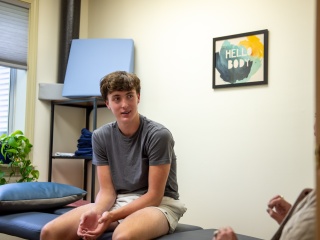Pediatric Rheumatology
Pediatric Rheumatology at Golisano Children's Hospital
Arthritis and other rheumatic diseases can get in the way of kids being kids. If your child has been sidelined by joint pain and other symptoms, the pediatric rheumatology team at Golisano Children’s Hospital at University of Vermont Health is here for you.
We provide leading-edge care with skill, kindness and a passion for supporting kids and their families.
Childhood rheumatic diseases are typically chronic conditions. Modern therapies can reduce or eliminate symptoms and help children lead full, active lives.

Why Choose Golisano Children's Hospital?
As the only pediatric rheumatology program in Vermont and northern New York, we offer:
- Expertise: Our pediatric rheumatology team has extensive experience in diagnosing and treating autoimmune rheumatic conditions that affect children. Families and physicians across the region turn to us for the latest therapies and expert guidance.
- Multispecialty team: Rheumatic conditions often affect multiple areas of the body. We partner with specialists in ophthalmology, orthopedics, dermatology, gastroenterology, cardiology, pulmonology and physical therapy to ensure your child receives all the care they need.
- Personalized approach: Our family-centered approach to care recognizes your child’s unique physical, psychological and communication needs. We provide education and support to help you and your child make treatment decisions and learn how to manage their condition.
- Convenient care: For your convenience, we coordinate multiple appointments on the same day and offer telehealth to bring care to you whenever possible. We also help you access lab testing and other services in your community.
Conditions We Treat
The main conditions we treat in children are autoimmune-related. Autoimmune diseases are caused by an overactive immune system that attacks healthy cells. The most common pediatric autoimmune diseases include:
- Autoinflammatory diseases: These conditions, also called fever syndromes, cause a fever in the absence of an infection. PFAPA syndrome is a type of pediatric autoinflammatory disease. Symptoms include fever, mouth sores, sore throat and enlarged lymph nodes. Joint pain, headaches and rash can also occur.
- Connective tissue diseases: Connective tissues connect, support and separate other tissues. Systemic lupus erythematosus (SLE) is the most common connective tissue disease in children. SLE causes widespread inflammation in the joints, skin, brain, blood vessels and internal organs.
- Juvenile idiopathic arthritis (JIA): Juvenile idiopathic arthritis is a group of several conditions that affect the joints and other tissues. The main signs are joint pain, stiffness, redness and swelling. Other symptoms may include a scaly rash (psoriasis), digestive problems, fever and fatigue.
- Vasculitis: Vasculitis includes many diseases that cause inflammation of the blood vessels. Kawasaki disease is a rare type of vasculitis that typically occurs in children under age five. Symptoms include a fever, rash and irritation of the eyes, mouth and throat.
Child Life Program
Medical care can be overwhelming for children. Our Child Life Specialists help your child cope with stress, prepare for procedures and understand their care. These highly trained specialists offer your family support as you navigate our health system.

What to Expect
State-of-the-art rheumatology care involves comprehensive evaluations and personalized treatment plans. It requires an experienced team that is familiar with the latest therapies for young patients. Our pediatric rheumatology team strives to expertly diagnose and manage complex conditions while maintaining a close connection with your child and family.
When you come to us for care, you can expect:
Your provider takes time to listen to your child and understand their symptoms. They will perform a thorough physical exam and may order diagnostic tests, including:
- Blood tests: Look for markers of inflammation or disease
- Joint fluid analysis: Detect inflammation in the fluid that cushions your child’s joints
- Imaging tests: X-ray, ultrasound, CT and MRI scans look at your child’s bones, joints and internal organs
We tailor treatments to your child’s condition with a goal of achieving low or no disease activity (remission). The main treatments for rheumatic conditions are disease-modifying antirheumatic drugs (DMARDs), which work by suppressing your child’s immune system.
DMARDs come in different forms, including:
- Pills your child takes by mouth
- Injections we can teach you to give your child at home
- Infusions your child may receive at a UVM Health location
To reduce pain and inflammation, your provider may recommend other medications, such as nonsteroidal anti-inflammatory drugs (NSAIDs) or corticosteroids. We also offer corticosteroid joint injections, which can provide longer-term pain relief.
Your child may benefit from physical and occupational therapy to help them improve their mobility and perform daily activities more easily. Our team coordinates with therapists across the region to ensure your child has access to these services.
Our team gets to know your whole family and works to make sure you have the resources you need to care for your child. If you need assistance, our social workers can help with transportation, food, emotional support and other services.
Between ages 18 and 22 (or earlier in the event of pregnancy), pediatric patients transition to an adult rheumatologist. We coordinate with the UVM Health Rheumatology and Immunology Program to ensure a smooth transition of care.
Awards & Certifications
Childhood Arthritis and Rheumatology Research Alliance (CARRA) Membership
Our Pediatric Rheumatology Program is a member of CARRA. This organization runs clinical trials and manages a registry of treatment and outcome data to identify best practices in childhood arthritis and rheumatology care.
Locations near you
Share your location to see nearby providers and availability
111 Colchester Avenue
Burlington, VT 05401-1473


